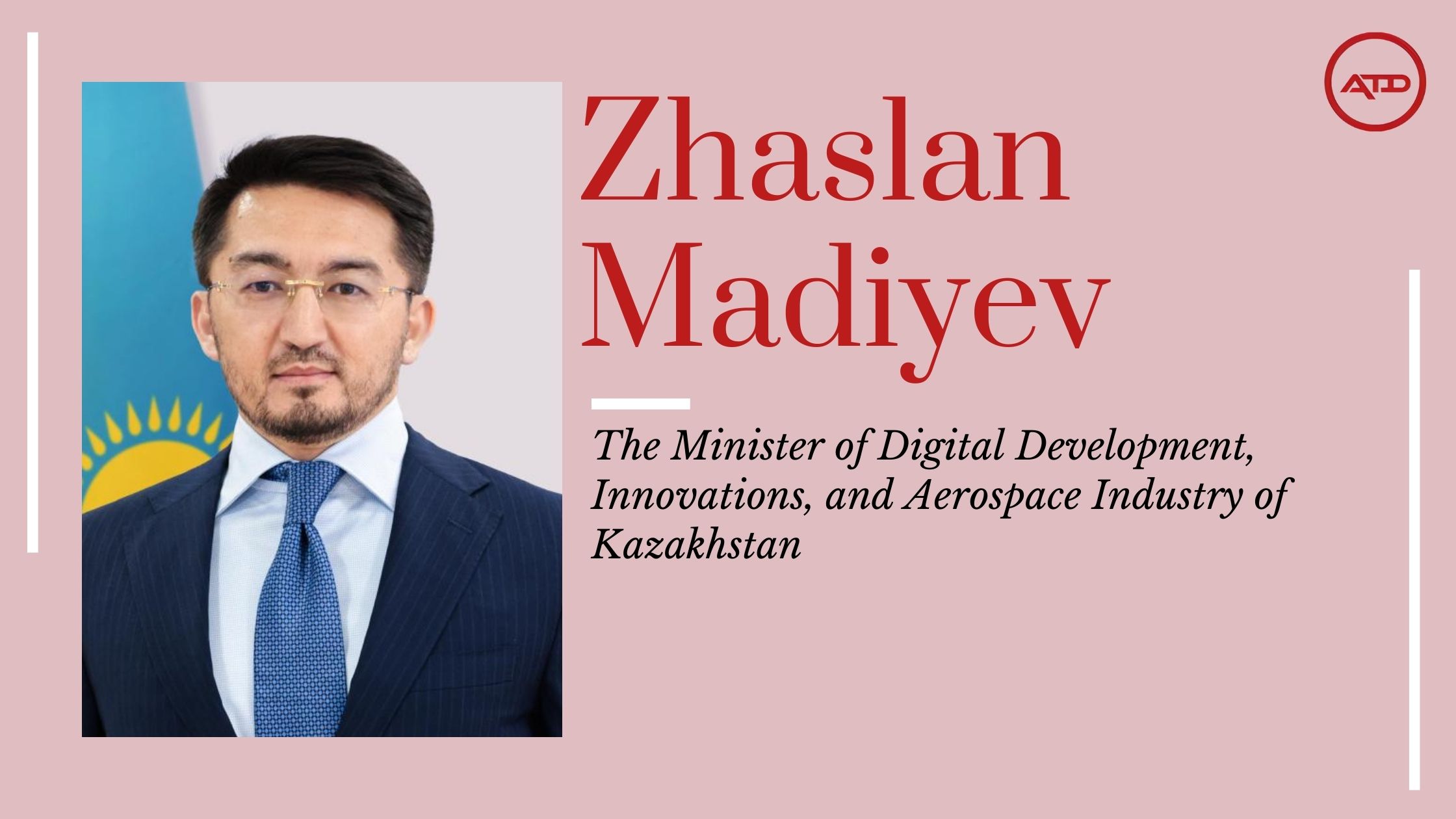AsiaTechDaily – Asia's Leading Tech and Startup Media Platform

Exclusive: Kazakhstan’s Digital Strategy for 2029 and Beyond – Minister Zhaslan Madiyev Talks AI and Startups
Kazakhstan recently launched an initiative, the Venture Fund of Funds, with an initial capital of $130 million, with a target of reaching $1 billion. The purpose of this fund is to attract global venture capital expertise to Kazakhstan, specifically focusing on growth-stage investments. The fund aims to help Kazakhstan’s startups scale and compete on a global level by providing them with the necessary resources to expand.
The primary objectives of this initiative include bringing international technology expertise to the country, supporting talent, and ensuring that local startups become competitive in the global market.
This development comes at a time for Kazakhstan’s startup ecosystem, which has seen rapid growth over the past few years. The country has become a breeding ground for tech-driven solutions across fintech, agrotech, and AI.
To gain deeper insight into such initiatives, we had the privilege of speaking with Zhaslan Madiyev, Kazakhstan’s Minister of Digital Development, Innovations, and Aerospace Industry.
The minister shared insights on the updated roadmap, the government’s role in building a sustainable ecosystem, and future plans to attract international attention to Kazakhstan’s startup space. Through this conversation, we uncover the strategies driving the nation’s innovation agenda and explore the opportunities for collaboration between local and global players.
Digital Kazakhstan” is a significant initiative. Could you share your vision for the next phase of the program and its role in shaping Kazakhstan’s digital economy?
Since the launch of the “Digital Kazakhstan” program in 2018, the country has achieved remarkable progress in digitalization. Today, our priority is the implementation of a new Digital Transformation Concept, set to run until 2029. This concept outlines ambitious goals, including improving Kazakhstan’s digital competitiveness, increasing local content in IT services to 80%, and achieving high positions in international rankings for e-government and cybersecurity.
Artificial intelligence (AI) will play a central role in this transformation. We are developing a national AI platform to streamline the adoption of AI solutions across public and private sectors. Additionally, we are creating KazLLM, a large-scale language model powered by a supercomputing cluster, and deploying AI agents to optimize public services.
We firmly believe that human capital is the key to success. To ensure a steady influx of talent into the AI industry, we have launched an AI movement, with plans to train 1 million people in AI fundamentals over the next five years. This initiative focuses on students, schoolchildren, and civil servants, fostering a society that is intellectual, creative, and technologically equipped — our vision of a “Generative Nation.”
Kazakhstan recently hosted the Asia-Pacific Ministerial Conference on Digital Inclusion and Transformation. What were the key takeaways, and how will they shape the country’s future priorities?
The conference was a significant milestone in promoting digital inclusion across the Asia-Pacific region. We discussed ways to bridge the digital divide and deploy technologies like AI to enhance quality of life.
One of the key outcomes was the decision to establish a Center for Digital Solutions for Sustainable Development in Kazakhstan. This center will serve as a platform for knowledge exchange, helping regional countries improve access to digital services and foster greater cooperation.
We also emphasized infrastructure development, including the Digital Silk Road project — fiber-optic communication lines under the Caspian Sea. This initiative positions Kazakhstan as a key player in international digital infrastructure.
Astana Hub is gaining prominence as Central Asia’s largest tech park. What steps are being taken to support startups and entrepreneurs?
Astana Hub has become the heart of Kazakhstan’s innovation ecosystem, bringing together over 1,500 participants. We provide support to startups at various stages through incubation and acceleration programs, such as the AI’preneurs program and the Silk Way Accelerator in partnership with Google, helping startups scale globally.
We are also expanding regionally with 18 IT hubs across Kazakhstan, creating jobs and fostering innovation. Internationally, we have launched hubs in Saudi Arabia, Singapore, and the USA, which are driving IT exports — now reaching $529 million in 2023 across 86 countries. Astana Hub has also attracted major BigTech companies to establish offices, paving the way for collaboration and innovation. We are confidently progressing toward a target of $1 billion in IT exports by 2026.
There’s growing attention on women’s inclusion in the IT sector. What is your vision for the long-term?
We are actively supporting women in IT through initiatives like TECHNOWOMEN, the first organization for women in tech industries, along with programs such as IT AIEL, Tech Girls, and She Commerce. These initiatives focus on building in-demand skills, supporting entrepreneurship, and expanding opportunities. We believe that gender equality in tech drives economic growth and innovation.
How is Kazakhstan developing human capital for its digital ecosystem?
We are implementing the Tech Orda program, aiming to train 100,000 skilled IT professionals by 2025. Our education initiatives include both online and offline programs, such as Tomorrow School, AI’Preneurs, and Decentrathon 2.0. Online
efforts include AI-People Bootcamp and AI Quest 1.0. Our strategy focuses on supporting education, fostering international partnerships, and creating opportunities for youth to build a sustainable technological future.
Which key sectors in Kazakhstan’s startup ecosystem have the potential for global success?
Kazakhstan’s startup ecosystem has demonstrated significant success in areas such as fintech, artificial intelligence, agritech, medtech, and educational technologies (EdTech).
Over the past two years, through partnerships with Western accelerators like AlchemistX, Draper University, and the Silkroad Innovation Hub, Astana Hub has successfully sent more than 40 Kazakhstani startups to the heart of Silicon Valley for acceleration programs.
Each project has gained a unique opportunity to study the American market, adapt their products, and test numerous business hypotheses. Many startups have achieved successful sales, secured investments, and expanded their professional networks.
The results have shown that Kazakhstani startups have a real chance of success in the American market. Among the most successful projects are Beep, Acro, Parqour, Flowsell, Cybernet, and Call2action.
One standout example is the Kazakhstani startup GoDays, which participated in the K-Startup Grand Challenge in South Korea. The startup ranked in the top 20 best projects, securing 9th place. In Seoul, GoDays signed 11 memorandums of understanding with leading companies and Yonsei University. This showcases how our startups can successfully integrate into global ecosystems.
What initiatives is Kazakhstan pursuing with the World Bank and Silicon Valley to drive technology and innovation?
Collaboration with Silicon Valley accelerators has enabled startups to participate in residency programs, accelerating their integration into global markets. This year, we signed four contracts with AlchemistX, Stanford Healthcare Innovation Lab, Draper University, and Silkroad Innovation Hub. These agreements will provide
50 startups from Central Asia with opportunities to participate in training and residency programs in Silicon Valley.
All these achievements are the result of joint efforts with the World Bank and the FPIP project, underscoring Kazakhstan’s commitment to advancing its technological ecosystem on the global stage.
How is Kazakhstan utilizing AI to accelerate digital transformation across regions and sectors?
To achieve these goals, Kazakhstan has adopted an AI Development Concept, which serves as the primary strategic document for integrating and accelerating the use of AI across industries.
A key milestone in the country’s AI journey will be the establishment of the International Center for Artificial Intelligence, alem.ai. This center will become a platform where top talent and advanced technologies converge to benefit society. It will help unlock human potential, accelerate the development of key economic sectors, and integrate AI into various aspects of life.
Alem.ai will not only solidify Kazakhstan’s position on the global AI map but also become a symbol of the nation’s transformation.
On the technical front, work is underway on implementing a national AI platform. This centralized infrastructure is designed to support Kazakhstan’s government institutions in leveraging the capabilities of generative text AI. The platform provides a secure, efficient, and scalable environment for developing, testing, and deploying text-based AI solutions. It is currently in a pilot phase and is expected to be fully operational by 2025.
In terms of sectoral AI integration, one standout project is the Digital Family Map, which uses a decision-tree algorithm to quickly assess family well-being. The AI identifies key factors that contribute to changes in a family’s welfare category within minutes.
Other notable initiatives include the eGov AI chatbot, developed as a prototype to assist citizens with accessing government services, and the implementation of an intelligent transportation system in Almaty. The transportation system employs AI technologies to manage traffic, reduce congestion, and enhance safety.
This year, we have laid the groundwork for the necessary infrastructure and regulatory framework. By 2025, AI will be fully integrated across various industries, helping to drive efficiency, innovation, and progress across Kazakhstan.
What high-potential areas in Kazakhstan’s technology sector could attract significant investments?
Kazakhstan has substantial potential to attract investments in its technology sector, with key focus areas including artificial intelligence (AI), big data, and telecommunication infrastructure. We are actively developing projects such as the creation of the national AI model KazLLM and establishing research and development laboratories to enhance the competitiveness of our technologies.
Telecommunication infrastructure is another priority. For instance, the construction of the Trans-Caspian Fiber Optic Cable will create a stable digital connection with international hubs, opening new opportunities for cross-border collaboration.
Additionally, Kazakhstan is focused on advancing satellite communication technologies. A pilot project to connect schools and organizations via Starlink is currently underway. This year, we also signed a Memorandum with Amazon Kuiper to establish communication nodes and provide satellite connectivity services across Kazakhstan.
To further stimulate innovation and support startups, we have established international hubs such as the Al-Farabi Innovation Hub in Saudi Arabia and the Nomadiq Innovation Hub in Singapore. These centers facilitate the export of Kazakh IT solutions to global markets.
Looking ahead, we are planning to launch the Qazaqstan Venture Group, a $1 billion venture fund designed to finance startups and innovative technologies. This fund will serve as a powerful tool to accelerate the growth of Kazakhstan’s technological ecosystem. Kazakhstan is ready to become a reliable partner for investors by offering modern solutions and unique opportunities for growth.
Kazakhstan continues to invest in advanced technologies, including big data, telecommunications infrastructure, and satellite communication systems, to enhance its digital capabilities. Initiatives like the Trans-Caspian Fiber Optic Cable, along with partnerships with Amazon Kuiper, will significantly improve Kazakhstan’s digital infrastructure and open up new opportunities for international collaboration.
The establishment of the $1 billion Qazaqstan Venture Group fund is a key step in Kazakhstan’s efforts to support a thriving technology and innovation ecosystem. This fund is expected to play a critical role in supporting startups and technological projects with high potential, driving the country’s growth in the global tech landscape.



